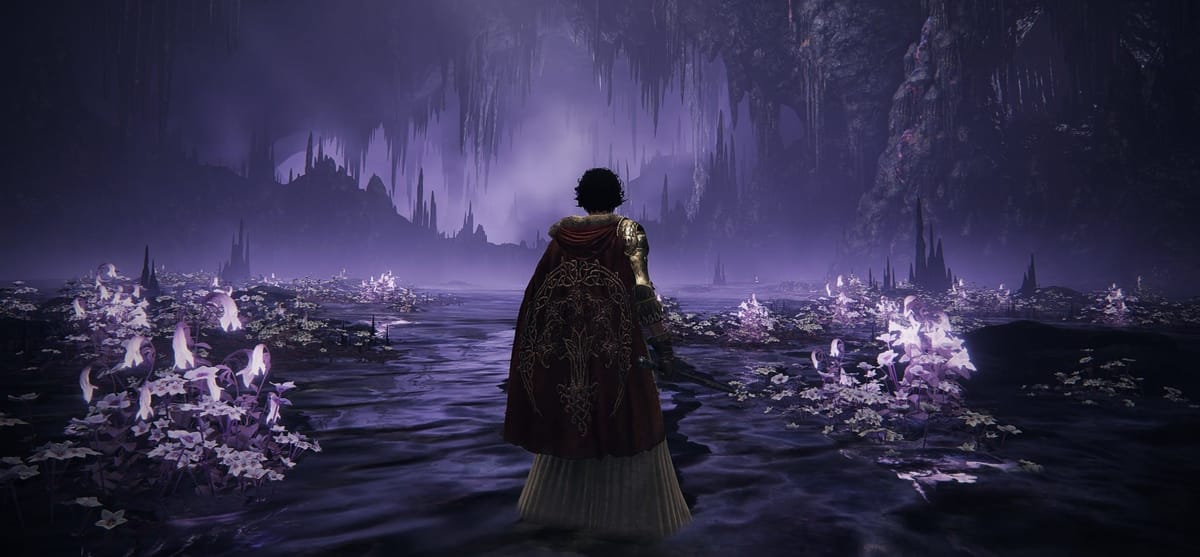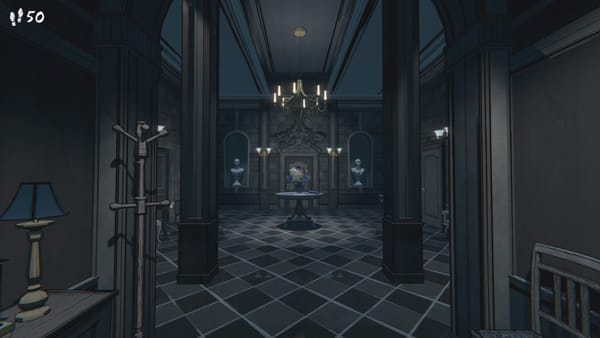Chance's Choice Awards 2024

Beginning this year, I would like to introduce the first annual Chance's Choice Awards. This prestigious and personal awards list is a curated compilation of books, albums, video games, movies, and television shows that brought me joy and meaning throughout this past year. Unlike other awards shows, the selections are not bound to the year in question, but are found on this list due to their impact to my life during the year in question: 2024. Unlike Spotify Wrapped and Steam Year in Review, this list makes no attempt to concern itself with quantifiable personal data. Unlike the New York Times Best Books of the Year and Pitchfork's Best Albums list, this list makes no commitment to consider the broader impact of the selected media on today's society.
This is a personal list.
A personal list that was created during one place and time, therefore subject to non-recorded changes as my memory evolves of this passing year. But with all of the qualifiers out of the way, I humbly present the Chance's Choice Awards 2024.
Imaginal Disk by Magdalena Bay
This is my unquestionable personal album of the year. I enjoyed Magdalena Bay's singles and Mercurial World, but released back in September, Imaginal Disk has transformed my love for pop music as a genre of earnest creativity and variance. It is suiting that this year has been flooded with great dance pop and electropop artistry. Charts have been dominated by the likes of Chappel Roan, Charlie XCX, and Sabrina Carpenter, but for myself, the champion of this sonic resurgence is this latest album from Magdalena Bay. On the surface, Imaginal Disk is a synth-pop album with prog-rock flare. It's giving ABBA meets Pink Floyd. Within this album is a broader narrative, but if I am being honest, that is not where my attention has been. I really enjoyed Mica's stellar vocal performance on tracks like "Cry For Me" and "Death and Romance". Her voice is so dynamic and lush. I also like how the excellent and heavily-layered production across this whole album. And of course, I really enjoyed how diverse tracks sounded on Imaginal Disk with so much complexity, especially with tracks like "Tunnel Vision" and "Watching TV" that start with very soft synthpop beginnings and transition into grand progressive rock epics. I have been playing this album nearly daily since its release. It really is out of this world.
Elden Ring (+ Shadow of the Erdtree)
I could warble about the vibrant Cerulean Coast's blue wildflowers or ensnare you in a discussion about the labyrinth nature of long abandoned underground corridors. I could highlight the diversity of armaments and magic within your grasp or unveil fragments of lore from this shattered ancient realm. None of this would be sufficient to truly do justice to Elden Ring. Honestly, I have rewritten why this game is so meaningful to me so many times, that I don't think it can be appropriately expressed through the written language at this point. One simply cannot understand this game without playing it. That being said, I can write this confidently: Elden Ring is my favourite video game of all time and it is not even close. It has permanently altered how I play and evaluate video games. Fuck Bethesda and Long Live FromSoftware!
Black Earth: The Holocaust as History and Warning by Timothy Snyder
This book is a brutal revisionist history of the Holocaust. Unlike other historical texts on the tragedy, it focuses less on the grueling slaughter and more on the conditions that allow such evil to take place. Within this book Snyder makes the compelling argument that Hitler's "biological anarchism" and the German nationalist idea of Lebensraum merged to produce an extremist ideology that provided an ecological and intellectual justification for the mass murder of other peoples (specifically the European Jewish population). They believed that they could restore an ecological equilibrium and waged a colonial war within Europe itself. As states within Central and Europe collapsed, statelessness opened up a pathway for genocide to be carried out against unprotected and marginalized populations. By the end of the book, Snyder brings these lessons into the 21st century and the developing polycrisis. As the climate emergency escalates and global conditions continue to break down, we will witness, or heaven forbid, be victims, to the same cruelty.
Succession
Throughout this year, Taylor and I have binge watched many fantastic (and mediocre) television programs. None of been able to match Succession in its sheer concentrated quality. Succession merges dynastic familial politics, corporate skullduggery, and the power behind media into a grand four season odyssey. This journey follows the Roy family and their lumbering global media empire. Within this heinous, decadent, and powerful dysfunctional family are complex and well-defined characters. Much of the show involves the children of Logan Roy squabbling over his empire and attempting to outmaneuver him or each other in pursuit of corporate leadership, but just as their fortunes were founded on the exploited and conquered, they too are presented with an existential threat: Silicon Valley and Big Tech.
The Beauty of Games by Frank Lantz
In this book, Frank Lantz makes an argument that games, digital or not, matter for their beauty. He justifies that while games are often overlooked, they require a similar, if not more complicated, aesthetic appraisal that demands an earnest attention. Going further, Lantz views games as an "interactive system" with "a set of interlocking behaviors bound by rules through which we navigate, as players, with our choices and actions." And in order to truly appreciate a game, one must play it as an aesthetic act. Within this book, he also conducts two in-depth examinations into a couple popular games: Poker and Go. This is used as a case study to further cement his belief regarding games as aesthetics. Just an interesting book that got me thinking about what I value about games in the first place.
Lethal Company
For a game that costs less than my order at Scozzafava's Deli, Lethal Company is a fantastic party game that brings out the best in proximity chat and the survival horror genre, then adds a great deal of goofy shenanigan potential for good measure. More than any game this year, Lethal Company consistently got my friends together more often than anything else. Ultimately, you and your crew works on a scavenging vessel that must scour a procedural-generated maze-like underground facility for assorted materials, toys, and equipment. During these expeditions, your crew is met with the challenge of navigating these dark tunnels and avoid deadly traps (like an automated turret), but more distressing is the tension of running into a SCP-style monstrosity. Whether it is a Bracken, Thumper, or Manticoil, all of these monsters have their own proclivities and nuances in dealing with them, though overwhelmingly, they all share a general hostility towards you and your team. As you explore and loot this facility, your goal is to meet the quota set by your ominous employer: The Company. After your three days, you will sell off your scavenged goods and begin the process again, though the surplus can be used to upgrade your team's vessel and equipment, which might be necessary for more hazardous moons. All of this creates a hilarious, though at times heart-pounding, survival horror game that is a blast to play with friends (even if you spend a lot of time spectating due to an untimely early death due to inattention to pits and traps).
Age of Empires IV
Throughout this year, whenever Taylor and I were struggling to find a new game to play, we would often return to Age of Empires IV. AoE IV is a real-time strategy game developed by Relic Entertainment to pits civilizations (often of the Medieval Era) against each other either through a campaign or skirmishes. Through I have certainly tried the campaign, Taylor and I found our enjoyment of the game through the skirmishes, whether we were cooperating with or fighting against each other. In this mode, if you include the Sultan's Ascent expansion, there are 12 main civilizations to choose from (along with some variant civilizations). Each civilization has unique mechanics, technologies, units, and flavour that makes them interesting enough to replay again and again, especially as you get to know their strengths and weaknesses over time. For the most part, Taylor played the English and I played the Ottomans, with both of us leaning on the Delhi Sultanate (Go War Elephant Go!). Regardless, in any game, you will use villages to extract resources and build up your civilization's economy, military, and technology. In many games, you'll have different victory conditions that you can pursue, though Taylor and I often go for regicide and try to kill the other civilization's monarch. Ultimately, however, the greatest rewards of my time playing AOE4 was the time I spent with Taylor (and their massive defense systems).
Loss of Life by MGMT
Over the past year, I felt a creeping sense of anxiety regarding leaving my 20s and entering my 30s. In my head, I imagined my youth vanishing before me, with myself being left with body pains and regret. Of course, by November 24th, I found that nothing really changes. In fact, if anything, I feel a renewed sense of optimism for Taylor and I's future, even if money is always tight and my ankles hurt when I get out of bed. It is a blessing to age, but anxiety is a normal. MGMT's Loss of Life captured that anxiety for me and I strongly related to it. This neo-psychedelic progressive pop album is chalked full of complex feelings about the matter. "People In The Street" present the listening with how the normalization that comes with age breeds a form of disconnection from the world. Cynicism is at the forefront of "Nothing Changes" with age bringing a certain feeling a permanency to life's affairs. The belief that we will always be pushing the boulder up this fucking hill. And "Mother Nature" is about recognizing your own role within the cycle of life. MGMT is not the same band that released "Time To Pretend" or "Kids", they are older and that comes with some wisdom about life itself.
Frostpunk 2
Joseph Stalin is often attributed to the following quote: "a single death is a tragedy, a million deaths are a statistic". Despite how accurate that attribution is or is not, Frostpunk 2 is oriented towards strategizing with that sentiment in mind. While the prior title is more intimate to the denizens of New London, the sequel relishes in a broader view. From this vantage point, it becomes even easier to allow the ruthless piling of frozen and putrid corpses to be glossed over in the name of long-term planning and the end goal of advancing the prospects of your city's survival. For the main campaign, you start thirty years after the events of the first game in the immediate aftermath of the Captain's death with a looming energy crisis on the horizon. As the Steward, you will lead New Londoners through this hinge moment and beyond, as you continue to be besieged by elemental forces beyond your control. But further still, divergent alternative political visions for the future emerge and your city is captivated by deepening polarization with some residents siding with either the Stalwarts and the Pilgrims. This main campaign ultimately culminates in a creeping extremism plunging your city (and its colonies) into violence and radical solutions to questions of survival. Beyond the main campaign, there is an additional mode called Utopia Building (excellent tongue-in-cheek name) that is more of an endless sandbox mode with a variety of different factions/interest groups, maps with unique planning challenges to contend with, and victory conditions. All together, this is a atmospheric strategy game that deserves any city-builder fans' attention.
Station Eleven by Emily St. John Mandel
This is a quiet post-apocalyptic novel set in the aftermath of the Georgia Flu's near-annihilation of human civilization. Unlike other post-apocalyptic worlds, this world is quieter and demands self-introspection in its more silent moments. It calls upon the reader to ruminate on the importance of arts and companionship under the worst of circumstances - to think beyond survival. She does this through a generation-spanning interconnected tale of creative, flawed, and broken people bravely continuing to expressing themselves in the aftermath of the old world's collapse. For myself, I connected with this book more than other novels over the past few years, largely due to my memories of teaching performing arts to elementary students in Winnipeg during the pandemic. Though the fine arts are often begrudgingly scolded as useless in the eyes of ignorant and ungrateful cynics, I have seen the power of artistic expression during a brutal time for myself and these students. When we acted and danced in our classroom, we were carrying forward the human tradition of making and enjoying the arts under dreadful circumstances. And I think we will always do that. Even if Silicon Valley seeks to cut the threads the bind humans and their creativity.

